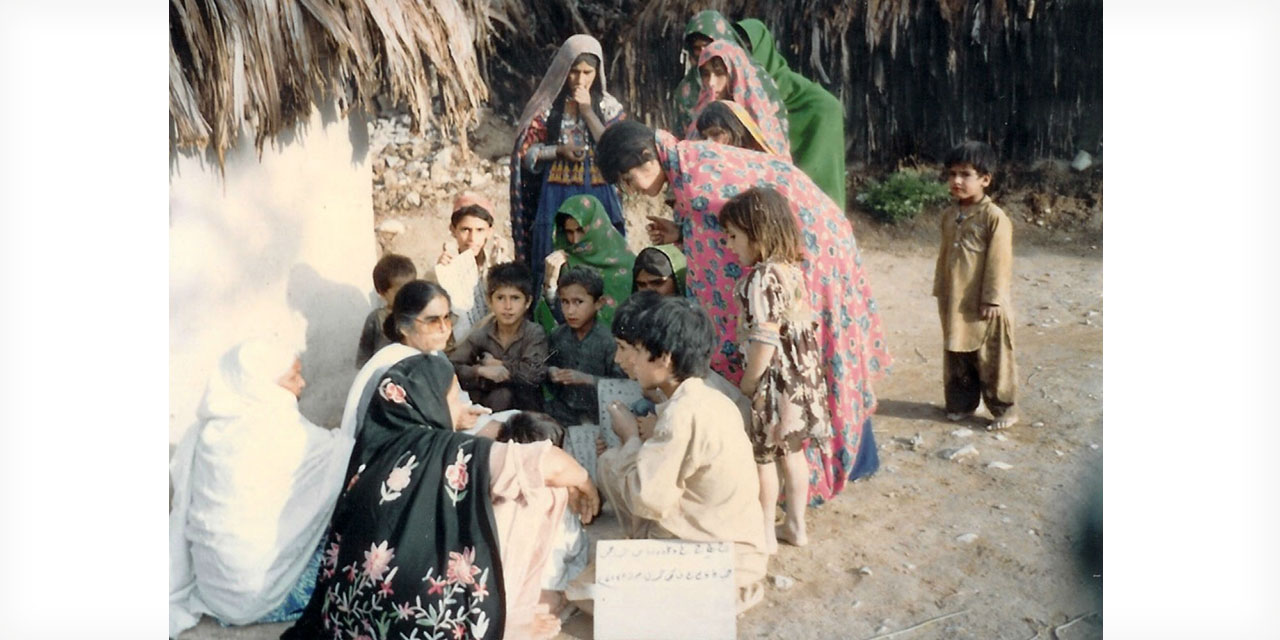The Union “St. Catherine of Siena” was founded in 1924 by Luigia Tincani (1889-1976) with fr. Ludovico Fanfani, a Dominican (1876-1955), as its co-founder.
At the beginning of the 20th century Tincani gathered around her a group of Dominican Tertiaries who were college students or teachers, intending an incisive and sympathetic presence of consecrated personalities in state schools and in society.
Maturing together in the Dominican spirituality by prayer and study, Tincani and her companions made their first consecration on April 30, 1917 in the cell of St. Dominic in St. Sabina, Rome.
Pope Benedict XV (1918) encouraged them and Pius XI (1923), appreciating the project of the “Union St. Catherine of Siena”, added to it the specification "of School Missionaries" to express clearly their individual apostolate in the midst of society.
Some of the first Missionaries in those days settled themselves in the Dominican Convent of St. Dominic in Gubbio and opened a high school there to begin community life and to experience together the teaching mission.
Fr. Ludwig Theissling, Master of the Order of Preachers, approved the first Rule (1919) and aggregated the Union to the Order (July 22, 1924).
Union obtained the diocesan recognition of the Bishop of Gubbio on August 4, 1924 and first professions were made on August 28 of the same year. First pontifical approval was in 1935 obtained and definitive approval on January 25, 1943.
In addition to institutional insertion in public schools and in individual apostolic activities through liberal professions and different fields of education in Italy and in other countries, the Union has taken initiatives in the line of formation: a school of Theology for lay people (1913), today “Mater Ecclesiae” linked to the Pontifical University of St. Thomas Aquinas in Rome; residences for students in different countries (Italy, Pakistan, India, Poland); foundation of the “Magistero Maria SS Assunta” (1939) in Rome, today Free University “Maria SS. Assunta” (LUMSA), for forming formators and professionals, and the school “Sedes Sapientiae” (1945-1972) for professional formation of religious teachers. Since 1963 Union took charge of the “National (now International) Centre for Catherinian Studies” in Rome. In 1966 in Bologna a Youth Library was established, which in 1981 became the "Carlo Tincani’s Institute”, managing the "Free University for adults and the elderly".
Union’s international venture witnessed its growth with the foundation of communities in Pakistan (1948), India (1967), Holland (1981) and Poland (1990). In the social transformations of an increasingly interconnected world, the Dominican charisma of the Union offers to the Missionaries its most diverse possibilities of implementation in solidarity with their contemporaries.

Color Option
Contacts
![]() Via Appia Antica 226
Via Appia Antica 226
00178 Rome (Italy)
![]()
+39 06 78 44 11 ![]() +39 06 78 44 11 217
+39 06 78 44 11 217![]() This email address is being protected from spambots. You need JavaScript enabled to view it.
This email address is being protected from spambots. You need JavaScript enabled to view it.
Keywords
Christmas
Chronos
cross
cryopreservation
Distance Adoption
Easter
education
elixir of life
Encounters
eternal life
eternity
Faust
Foundress
future of the man
hibernation
Historical Archives
HumanPlus
in dialogue
Lahore
life in man
Luigia Tincani
mission
ongoing projects
Our history
Pope Francis
Posthuman
Saint Catherine of Siena
School Missionaries
Synod 2018
Union “St Catherine of Siena” of School Missionaries
About Us
Union “St. Catherine of Siena” of School Missionaries is a Dominican Religious Congregation.
We are called to accompany our contemporaries along their path with study and prayer and to seek along with them Gospel’s answers to the questions of our complex, multicultural society.
We want to live therefore coherently a Christianity of frontiers and be yeast and salt of the least visibility yet cause to leaven and give flavor.
We are called to accompany our contemporaries along their path with study and prayer and to seek along with them Gospel’s answers to the questions of our complex, multicultural society.
We want to live therefore coherently a Christianity of frontiers and be yeast and salt of the least visibility yet cause to leaven and give flavor.








